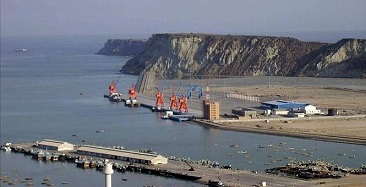Pakistan transfers strategic Gwadar port to China
On February 18, the Pakistani government transferred operational control of its strategically-located deep-sea port at Gwadar, Balochistan province to China. India, a rival of Pakistan and of China, has expressed concerns over the deal—highlighting the increasingly complex geo-political rivalries stoked by the Obama administration’s policy of “pivot” to Asia.
Gwadar is situated on the Arabian Sea, just 180 nautical miles (330 kilometres) from the Strait of Hormuz, through which a third of the world’s oil supply passes. It offers a prime location to monitor shipping passing through the Strait of Hormuz from the Persian Gulf, as well as access to cheap land routes or Middle East trade through Pakistan into western China and Central Asia.
The agreement to transfer the port to the state-owned China Overseas Port Holding Company was signed in a ceremony attended by Pakistani President Asif Ali Zardari, several ministers, and Chinese Ambassador Liu Jian. The previous operator, the Port of Singapore Authority (PSA), withdrew after Islamabad refused to provide large land allotments the PSA wanted for development work around the port.



























